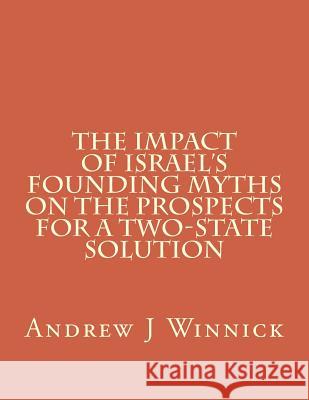The Impact of Israel's Founding Myths on the Prospects for a Two-State Solution » książka
The Impact of Israel's Founding Myths on the Prospects for a Two-State Solution
ISBN-13: 9781523923700 / Angielski / Miękka / 2016 / 68 str.
The introduction to this book begins with the following quote: ..".what you should really look for...is intellectual integrity: the willingness to admit mistakes and change course... the willingness to entertain different ideas...I'm not calling for an end to ideology...What you should seek, in yourself and others, is not an absence of ideology but an open mind, willing to consider the possibility that parts of the ideology may be wrong." Paul Krugman in an article entitled Ideology and Integrity, NY Times, May 1, 2015 The goal of this brief book is to ask readers interested in the Israeli/Palestinian conflict to accept the challenge presented by Krugman. Readers are asked to be willing to consider the well-documented historical facts presented in this book and, in that light, to (re)evaluate their understanding of: (1)The circumstances leading up to the founding of the State of Israel (2)The War of Independence fought between Israel's founders and both the Palestinians and the Arab forces from surrounding nations. This includes an examination of the circumstances under which more than 700,000 Palestinians left as refugees and 150,000 others were displaced within what became Israel (3)The history of negotiations over the last 25 years between Israelis and Palestinians to come to a Two-State Solution: Israel and Palestine functioning side-by-side in peace and security. This analysis is done by specifying and examining 15 popularly held myths. This work starts by providing a critical analysis of five myths about the founding of the State of Israel and then six myths concerning the nature and conduct of Israel's War of Independence, known to Palestinians as Al Nakba, The Catastrophe. Evidence is presented that these eleven statements indeed are myths, that the statements are not true, no matter how firmly many people believe in them or how often they are repeated. It is argued that the (false) belief in these myths has led to many of the problems in negotiating a Two-State Solution. The author clearly hopes that the corollary is also true: that the sooner it is understood that these are indeed myths, the sooner it may be possible for the two sides to successfully conclude negotiates. In addition, four myths concerning the history and current status of the negotiation process concerning the establishment of two states are explored. In the context of examining these 15 myths a series of embedded topics are analyzed, including: the nature of the British Mandate over Palestine prior to Israel's founding the actual role of the U.N. in the formation of Israel the history of Jewish and Palestinian nationalism the relative strengths and actions of the settler/Israeli forces and those of the Palestinians and five invading Arab nations in the 1947-49 war, especially concerning the charges of ethnic cleansing and massacres a brief overview of some of the past negotiations toward a Two-State Solution the nature and makeup of the current (2015-2016) Israeli government the impact of the demand for recognition of Israel as a "Jewish State" and Theodor Herzl's use of that term the nature of and problems within the Palestinian leadership the impact of the 2015 disputes over the Iran nuclear agreement the role of the charge of anti-Semitism in deflecting criticism of the Israeli government's policies in the context of the U.S. State Department's definition of anti-Semitism The express goal of this work is to pull together, in a brief and easily accessible format, what are often disparate analyses of these many topics in the hope of stimulating learning and discussions that will better enable concerned persons to propel movement toward the establishment of two states, Israel and Palestine, both enjoying peace, security and economic development. In that spirit, readers are encouraged to consider disseminating this work to friends and colleagues."
Zawartość książki może nie spełniać oczekiwań – reklamacje nie obejmują treści, która mogła nie być redakcyjnie ani merytorycznie opracowana.











